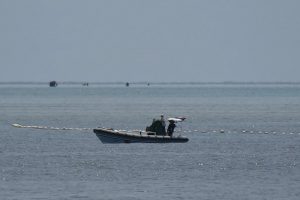China’s environmental authority on Thursday vowed to reduce greenhouse gases to net zero by 2060 and achieve carbon peak before 2030. It added that the country will explore ways to promote the capability of carbon sinks in the ocean.
“The Ministry of Ecology and Environment (MEE) in China has been urging local governments to accelerate ecological restoration of oceanic ecology and organizing monitoring and evaluation on carbon sinks in the ocean,” Zhang Zhifeng, vice director at the Department of Marine Ecology and Environment under MEE said at press conference on Thursday, as per Global Times reports.
Also read: Rain on Greenland’s ice sheet portends further rise in sea levels
What is a carbon sink?
A carbon sink is a a natural or an artificial reservoir that can store carbon extracted from the atmosphere. Plants, the ocean and soil are key carbon sinks as they absorb carbon-di-oxide and carbon in other form. Oceans are a major carbon storage system as marine animals take up carbon-di-oxide for photosynthesis, while some gas simply dissolves in the seawater.
The amount of carbon on Earth never changes, it is just the form and location that do.
Also read: Wildfires in Russia spread to central region, emergency declared
China is the world’s top greenhouse gas emitter and now aims to increase its forest sink by 6 billion cubic metres above the 2005 level. Beijing plans to plant 500 million mu (about 33.33 million hectares) of forests and grasslands in the next five years – 100 million mu per year — to help achieve its carbon emission reduction goals, according to the country’s forestry authorities.
Also read: Explosive California wildfires could burn into December
“Maintaining ocean blue sink and steadily improving ocean carbon sink capacity are important tasks to facilitate our climate goals,” Zhifeng added.
Although China has been trying to improve its coastal water quality, especially near the Bohai Bay and Yangtze River Delta, Reuters reports, data from the environment ministry shows that 17 out of the 24 monitored marine ecological systems were in a “sub-healthy” or “unhealthy” state in 2020. The number of marine species in these are below the normal range.






